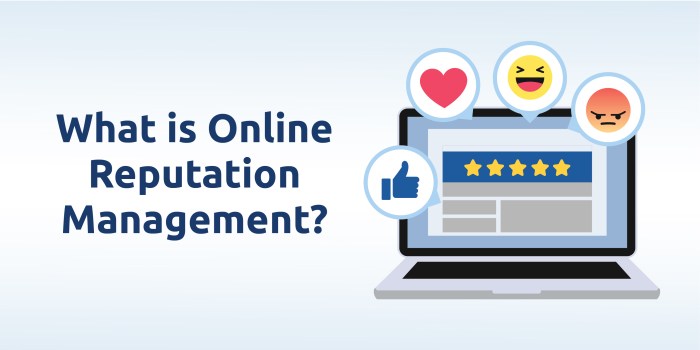Online Reputation Management, a crucial aspect for individuals and businesses alike, is the key to shaping how the world perceives you in the digital realm. From proactive strategies to reactive approaches, let’s dive into the realm of ORM and explore its impact on online presence.
Definition of Online Reputation Management

Online Reputation Management (ORM) refers to the practice of monitoring, influencing, and managing the reputation of an individual or business on the internet. It involves controlling what information is available online and how that information is perceived by others.ORM is crucial for individuals and businesses as it directly impacts how they are perceived by potential customers, clients, employers, and partners.
A positive online reputation can lead to increased trust, credibility, and opportunities, while a negative reputation can result in lost business, damaged relationships, and hindered growth.
Importance of ORM for Individuals and Businesses
- Building Trust: A strong online reputation helps build trust with potential customers and clients, leading to increased business opportunities.
- Attracting Opportunities: A positive online presence can attract new job opportunities, partnerships, and collaborations.
- Managing Crisis: ORM allows individuals and businesses to effectively handle and mitigate any negative information or crises that may arise online.
Examples of How ORM Can Impact Online Presence
- Positive Reviews: Positive reviews and testimonials can boost the reputation of a business and attract more customers.
- Social Media Presence: Maintaining an active and engaging social media presence can help individuals and businesses connect with their audience and build a positive reputation.
- Search Engine Results: Ensuring that positive and relevant information appears at the top of search engine results can improve online reputation and credibility.
Strategies for Online Reputation Management
When it comes to managing your online reputation, it’s essential to have both proactive and reactive strategies in place to ensure a positive image online.
Proactive Strategies for Maintaining a Positive Online Reputation
Proactively managing your online reputation involves taking steps to build and maintain a positive image before any negative content arises. Here are some strategies to consider:
- Regularly monitor your online presence by setting up Google Alerts and monitoring social media platforms.
- Create and maintain high-quality content on your website and social media profiles to showcase your expertise and values.
- Engage with your audience by responding to comments and reviews in a timely and professional manner.
- Build relationships with influencers and partners to help amplify positive messages about your brand.
- Invest in online advertising to promote positive content and push down any negative search results.
Reactive Strategies for Addressing Negative Online Content
Inevitably, negative content may surface online. It’s crucial to have reactive strategies in place to effectively address and mitigate any damage. Here are some reactive strategies to consider:
- Respond promptly to negative reviews or comments with empathy and a solution-oriented approach.
- Consider reaching out to the source of the negative content to resolve any issues and potentially have it removed.
- Create and promote positive content to overshadow any negative content in search engine results.
- Utilize online reputation management tools and professionals to help monitor and manage your online image.
- Implement a crisis communication plan to address any major reputation-threatening incidents swiftly and effectively.
Overall, the effectiveness of different ORM strategies may vary depending on the nature of the content and the platforms involved. It’s essential to tailor your approach based on the specific circumstances and continuously adapt your strategies to maintain a positive online reputation.
Tools and Platforms for Online Reputation Management

In order to effectively monitor and manage online reputation, businesses and individuals utilize various tools and platforms that offer insights into what is being said about them online. These tools help in tracking mentions, analyzing sentiment, and responding to feedback in a timely manner.
Popular Tools for Online Reputation Management
- Google Alerts: This free tool allows users to monitor the web for mentions of their brand, products, or services.
- Brandwatch: A comprehensive social listening tool that provides real-time data and analytics on brand mentions across various online platforms.
- Reputology: Specifically designed for managing online reviews, Reputology helps businesses track and respond to customer feedback on review sites.
How These Tools Work in Managing Online Reputation
These tools work by scanning the web for mentions of the brand or individual, analyzing the sentiment of these mentions, and providing insights into areas that need attention. By monitoring online conversations, businesses can proactively address any negative feedback and leverage positive feedback to improve their reputation.
Recommendations for Choosing the Right ORM Tool or Platform
- Consider the specific needs of your business or personal brand: Choose a tool that aligns with your goals and objectives for online reputation management.
- Look for user-friendly interfaces: Opt for tools that are easy to navigate and provide clear insights into your online reputation.
- Check for scalability: Choose a tool that can grow with your business and adapt to changing online reputation management needs.
Case Studies of Online Reputation Management
In the world of online reputation management, real-life examples provide valuable insights into successful strategies and the impact they can have on a brand’s perception and customer trust.
Case Study 1: Airbnb, Online Reputation Management
- Airbnb faced a major crisis when a host’s property was vandalized by guests, resulting in negative media coverage and public outcry.
- They responded quickly, offering a public apology, compensating the host, and implementing new safety measures to prevent future incidents.
- This proactive approach helped Airbnb regain trust and rebuild their reputation, showcasing the importance of swift crisis management in ORM.
Case Study 2: Starbucks
- Starbucks faced backlash after an incident in one of their stores where two black men were wrongfully arrested.
- They responded by closing stores for racial bias training, conducting a public apology, and initiating a dialogue on diversity and inclusion.
- This transparent response not only addressed the immediate issue but also demonstrated Starbucks’ commitment to social responsibility, enhancing their reputation in the long run.
Case Study 3: Domino’s Pizza
- In 2009, Domino’s Pizza received negative attention due to a viral video showing employees mishandling food.
- They launched the “Pizza Turnaround” campaign, acknowledging the issue, revamping their menu, and inviting customers to give feedback.
- This campaign not only restored customer trust but also led to increased sales and a positive shift in brand perception.












